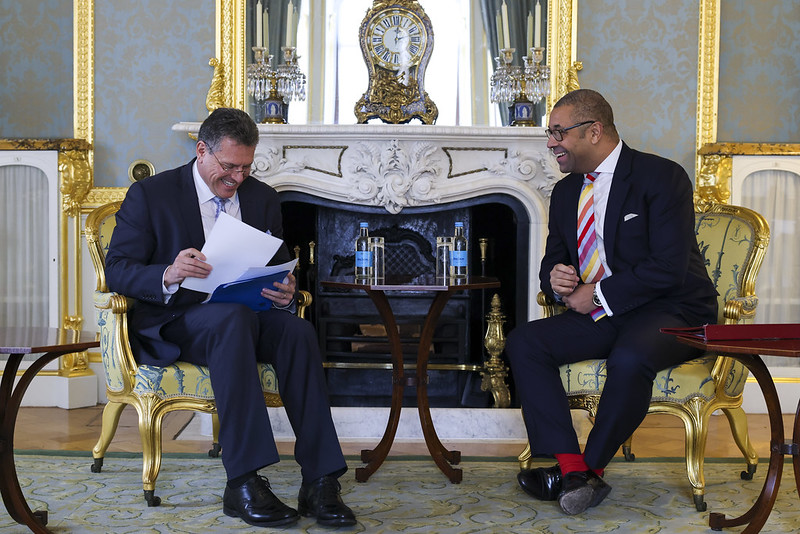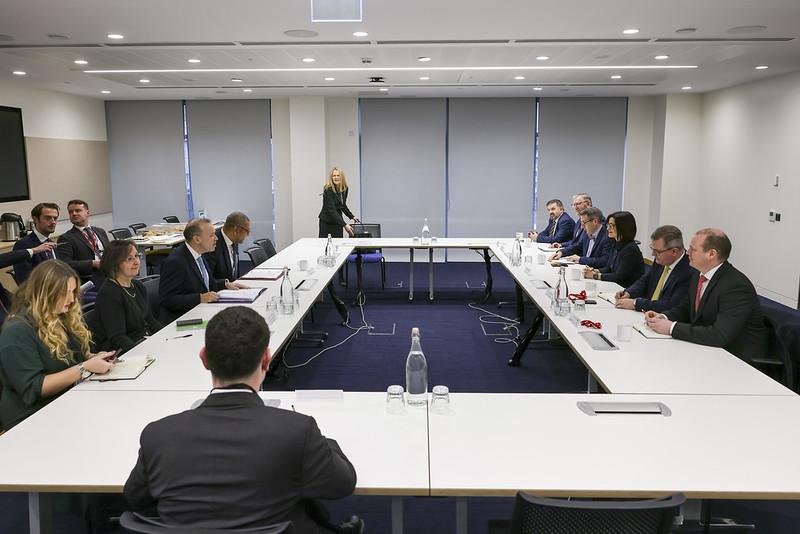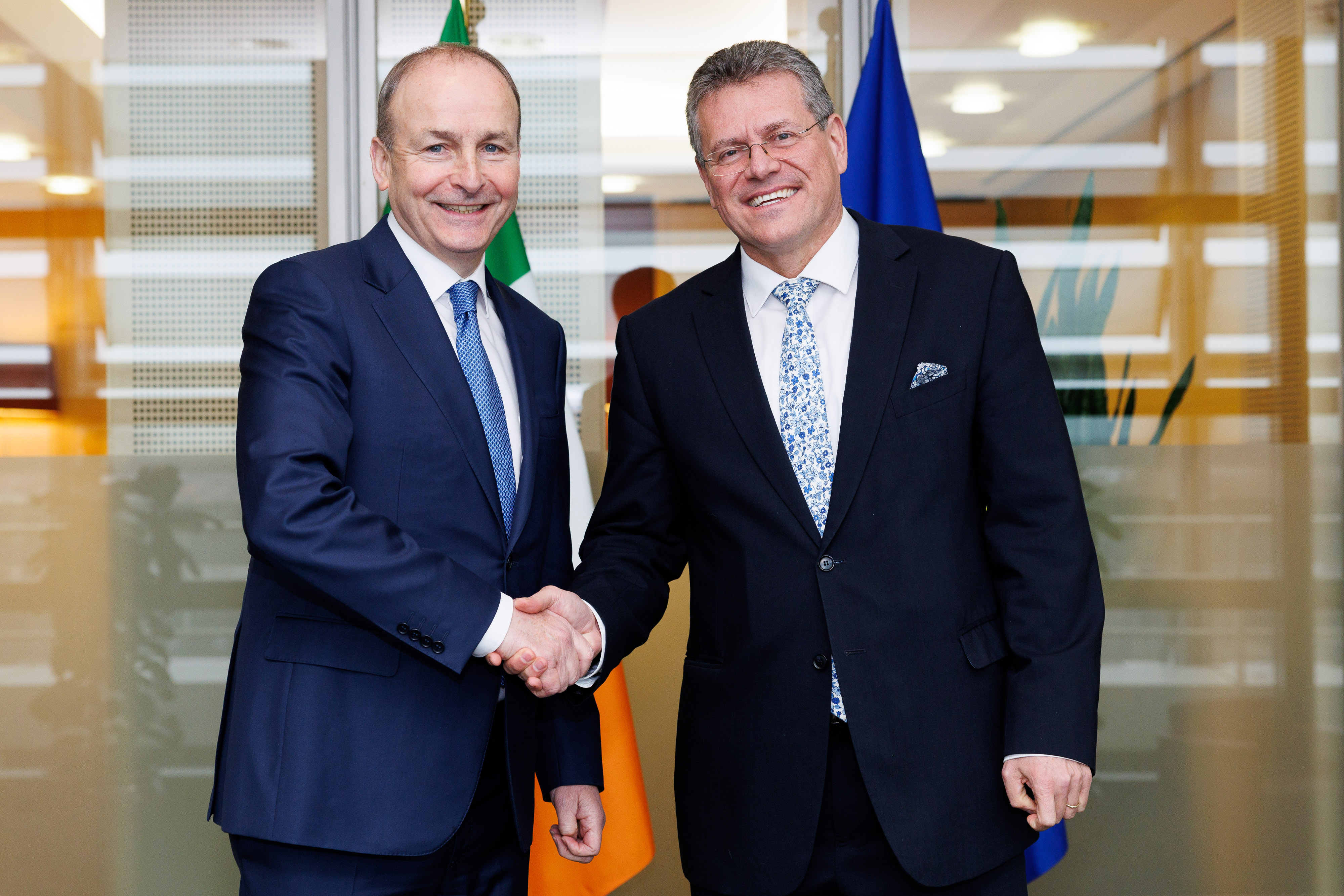Brexit & Beyond Newsletter
16 January 2023
Welcome to the 16 January 2023 Brexit & Beyond newsletter
The EU and UK are expected to set out agreed principles for resolving the Protocol issues. James Cleverly and Maroš Šefčovič held a video conference today, following last week’s announcement that they had reached an agreement on data sharing. Northern Ireland was a popular place among politicians last week - the Foreign Secretary, Secretary of State for Northern Ireland, Taoiseach, Tánaiste, and Leader of the Opposition visited and held meetings with political parties and businesses on the Protocol and related issues. The UK Government has brought forward legislation to ensure the construction of permanent border control posts in Northern Ireland.
This is the 100th issue of the NI Assembly’s Brexit newsletter. When we first started publishing briefings in late 2017, then Prime Minister Theresa May was setting out her vision for Brexit, making it clear that the UK would leave the EU single market. The EU and UK had committed to avoiding a hard border on the island of Ireland. PM May said, “We owe it to the people of Northern Ireland – and indeed to everyone on the island of Ireland - to get this right.”
EU and UK to set out framework agreement on the Protocol
Ahead of today’s video call between UK Foreign Secretary James Cleverly, NI Secretary of State Chris Heaton-Harris, and European Commission Vice-President Maroš Šefčovič, media reported that they are expected to publish a joint statement outlining an agreed framework for resolving the most difficult issues relating to the Protocol on Ireland/Northern Ireland. RTÉ reports that the aim of the statement is to show that there is agreement in principle on a number of areas, with the technical detail to be worked out in coming weeks. The BBC has published an article covering some of the contentious issues like agri-food checks. Commentators emphasise that the UK’s tone regarding the negotiations has changed - the UK’s assertion that the EU needs to change its negotiating mandate has been seldom heard in recent weeks.
The anticipated agreed ‘framework’ didn’t come today, but Cleverly, Heaton-Harris, and Šefčovič did publish a short joint statement. They discussed a range of ongoing challenges and agreed “this scoping work for potential solutions should continue in a constructive and collaborative spirit, taking careful account of each other’s legitimate interests.”
UK and EU reach agreement on data sharing
The UK and EU reached an agreement on one technical aspect relating to the Protocol - the EU’s access to UK IT systems which provide information on the movement of goods from GB to NI. The joint statement says this is “a critical prerequisite to building trust and providing assurance” and provides a “new basis” for talks. With this “renewed understanding”, EU and UK technical teams are working swiftly to resolve issues in other areas. A “cordial and constructive” meeting between James Cleverly, Chris Heaton-Harris, and Maroš Šefčovič was held on Monday 9 January when the deal was announced. Sharing of such data on trade movements is envisaged in the Protocol under Article 12.

European Commission Vice-President Maroš Šefčovič and UK Foreign Secretary James Cleverly | Source: Rory Arnold / No 10 Downing Street
Reactions to the agreement
The UK Government says that “While a range of critical issues need to be resolved on the Protocol, this agreement provides a basis for further constructive discussions with the EU to come to a negotiated solution.” Simon Coveney, former Irish Minister for Foreign Affairs and now Trade Minister, said that the lack of leaks in the talks shows that the EU and UK negotiating teams trust each other. He said the agreement on data sharing “can be the basis for more flexibility and cooperation in terms of how we manage the movement of goods” and is “an important step forward”. Gregory Campbell (DUP) said, "We need to hear the details of what this does for trading. It might just shift the burden slightly but it doesn't resolve the overall problem." Declan Kearney (Sinn Féin) welcomed the agreement, saying it should be the basis for work to reach a “pragmatic, durable agreement” on the Protocol. Matthew O’Toole (SDLP) said the deal was a positive sign. Stephen Farry (Alliance) said the deal could “hopefully unlock further progress” in coming weeks. He stated that the party’s key requirement for a deal on the Protocol is Northern Ireland retaining dual market access and that a deal must be “mutually agreed, sustainable and legal.”
“Still a way to go”
There are reports that negotiations could soon enter a “tunnel”, meaning secretive, intense talks which avoid leaks to the media. Taoiseach Varadkar said that European Commission President Ursula von der Leyen had advised him that negotiators are not yet in the ‘tunnel phase’ but needed “time and space and confidentiality” to come to an agreement. The UK Foreign Secretary said he wouldn’t set “artificial deadlines” for a resolution. According to a report from the Guardian, some EU diplomats think negotiations could go beyond the 10 April (the 25th anniversary of the Good Friday Agreement) but there is pressure to establish the outlines of a deal by 19 January (the current deadline for a NI Executive to be formed). RTÉ reports from Brussels that officials don’t expect a “big bang moment” in time for the anniversary of the Good Friday Agreement, but an incremental approach will be taken. Last week, Northern Ireland Secretary of State Chris Heaton-Harris said there is “still a way to go” to reach a deal, downplaying the agreement on data sharing. He said, "There has been a tiny bit of progress made in talks” with the EU. DUP leader Sir Jeffrey Donaldson said the EU and UK are not “anywhere close to a deal” and that this was clear from the Foreign Secretary’s update on Wednesday. He said despite some progress on technical issues, “major political issues…have not yet been addressed”. The DUP is currently declining to participate in NI’s power-sharing institutions, in protest at the Protocol arrangements.
More meetings, another deadline
UK Foreign Secretary James Cleverly travelled to Northern Ireland last week to hold talks with political parties, alongside the NI Secretary of State Chris Heaton-Harris. The meeting was attended by representatives from the DUP, UUP, and Alliance. Sinn Féin and the SDLP did not attend. They discussed the impact of the Protocol, and Ministers updated the NI politicians about talks with the EU, and the agreement reached on data sharing. The Foreign Secretary also met with business groups and visited Saintfield Garden Centre to hear about issues with the Protocol, such as restrictions on the movement of plants and seeds.

Foreign Secretary James Cleverly and NI Secretary of State Chris Heaton-Harris meeting representatives from the DUP, Alliance, and UUP | Source: Rory Arnold / No 10 Downing Street
The deadline for Northern Ireland’s power-sharing institutions to be re-established or another Assembly election to be called is this Thursday, 19 January. Heaton-Harris could postpone the deadline again. He said that while an agreement on the Protocol is “incredibly important”, his view remains that “the devolved institutions must return as soon as possible”, noting budgetary challenges and economic pressures.
After the meeting, Cleverly told the media he wouldn’t be rushed into signing a deal, saying, “We’re not setting timelines. We’re not setting deadlines. We want to resolve these [Protocol] issues as quickly as we can, but there are still gaps that need to be resolved.” He said the widely reported ‘good mood music’ is important, but “on its own it’s not enough…there are still genuine differences and they can’t just be wished away.”
DUP leader Sir Jeffrey Donaldson reiterated that the party’s seven tests would be used to assess any deal. He added that a deal would only work "if it can command the support of the unionist community”. Otherwise, he said recent work would be “a missed opportunity.” Andrew Muir (Alliance) said the meeting was “robust but constructive”. UUP leader Doug Beattie, speaking to the BBC’s Sunday Politics show, said he was told they (the UK Government) had “bigger fish to fry” than the Protocol. Beattie said he was also concerned about the lack of involvement of NI politicians in the process to reach a deal with the EU. The UK Ministers also met with business groups on their visit. Head of Trade at Logistics UK (and former NI Infrastructure Minister) Nichola Mallon said businesses were “encouraged by the Foreign Secretary’s positive approach and understanding of the issues” facing the sector.
Irish Government engagement
The Taoiseach Leo Varadkar travelled to Northern Ireland last week for meetings with the five main political parties and businesses. Varadkar said he is keen to “repair and restore relations” with the parties and the UK Government. He reiterated his view that mistakes were made in the Brexit process and that the implementation of the Protocol has been “too strict and too rigid”. He hopes changes can be made to the Protocol to “get back to a low number of checks”. Sir Jeffrey Donaldson said the meeting was “very constructive” and he thinks Varadkar now has a “better understanding” of the issues with the Protocol. He added, “We are in the mood to work with people to get a solution.” Sinn Féin leader Mary Lou McDonald said she believed "things could move actually quite quickly" on the Protocol.
The Tánaiste Micheál Martin also travelled to Northern Ireland to meet with the Secretary of State for NI, discussing the effects of the Protocol arrangements on political stability (among other matters). Earlier in the week Martin was in Brussels, where he had a “constructive” meeting with European Commission Vice-President Maroš Šefčovič. He said, “People are very cautious, correctly, in my view, and that's why I think we do need to give space to the EU and UK negotiators, to allow them time and space to go through all of the issues in great detail”. The previous day he had spoken by telephone with NI party leaders. Sir Jeffrey Donaldson said his conversation with Martin was “useful” but repeated his opposition to the Protocol. Sinn Féin’s Michelle O’Neill said she and the Tánaiste “share a common commitment on way forward to get a negotiated outcome on the Protocol and immediate restoration of power-sharing.”

Tánaiste Micheál Martin and European Commission Vice-President Maroš Šefčovič | Source: European Union 2023
The British-Irish Intergovernmental Conference is to take place this week, attended by UK and Irish Government Ministers.
Sir Keir Starmer visits Belfast
UK Leader of the Opposition Sir Keir Starmer was in Northern Ireland on Thursday and Friday. He met with the NI Business Brexit Working Group, and with political parties. Starmer pledged to support a deal on the Protocol, offering assistance to Prime Minister Rishi Sunak, should it not have sufficient support from Conservative MPs to get through Parliament. In a speech at Queen’s University Belfast, he addressed the PM, saying “Whatever political cover you need, whatever mechanism in Westminster you require, if it delivers for our national interest and the people of Northern Ireland we will support you.” Starmer said, "The time to put Northern Ireland above a Brexit purity cult, which can never be satisfied, is now." Labour says it would also pursue a veterinary agreement with the EU, which would reduce checks on agri-food products.
Construction of Border Control Posts
The UK Government has laid legislation in Parliament to allow UK Government Ministers to order the construction of permanent Border Control Posts in Northern Ireland. This is a requirement under the Protocol. In its explanatory memorandum for the legislation, the Government points to its proposals for the Protocol (in the Northern Ireland Protocol Bill) and the red and green lanes which would require the enhancement of existing SPS facilities. Goods in the red lane, which would not stay in NI but move into the EU single market, would be subject to enhanced checks and controls. The legislation will empower the UK Government Minister to order the recruitment and employment of sufficient and qualified staff. The legislation states that the NI Department of Agriculture, Environment and Rural Affairs must comply with such orders “irrespective of whether any matter has been brought to the attention of, or discussed and agreed by, the Executive Committee of the Northern Ireland Assembly.” The Statutory Instrument is subject to negative procedure meaning it does not require the active approval of Parliament. Read more about the background to the matter on RTÉ.
Other news
- The Lords Sub-Committee has published a response from the Minister for Europe, Leo Docherty regarding the committee’s findings on the Northern Ireland Protocol Bill. The committee has asked for further clarifications on matters which were not addressed. The Committee also received a response from the Foreign Secretary who said he is “hopeful” about the prospects for “a durable solution that protects both EU and UK internal markets, respects Northern Ireland’s constitutional position and works for the businesses and the people of Northern Ireland”.
- The NI Department for the Economy in December 2022 published a report on NI businesses’ experience during the first year under the new trading arrangements in the Protocol. It highlights issues for businesses such as lack of certainty, lack of understanding and preparedness for the arrangements, and increased costs for some businesses. The impact of the UK’s new immigration policy has also affected companies. The report finds that the Protocol and its portrayal has “politicised trading from Great Britain to Northern Ireland”. It notes that most businesses see the benefits of NI’s access to both the UK and EU markets and that by the end of 2021, rising costs were the dominant concern.
- The Commons Library has published a useful summary of key developments concerning the Retained EU Law Bill, including progress at committee stage and amendments, and legislative consent memoranda from the Scottish and Welsh Governments. Report stage and third reading of the Bill are scheduled for Wednesday 18 January.
- The European Commission has approved a €2.8 million Irish scheme to support the fishery sector which has been affected by Brexit.
- The UK Government’s Public Procurement Bill was debated at second reading in the Commons last week. According to the Government it provides “transformative new rules which rip up bureaucratic EU regulations”. The Government has published a document on the benefits of the Bill for prospective suppliers.
- Chris Elliot, Professor of food safety and microbiology at Queen's University Belfast says the lack of rigorous checks post-Brexit on goods coming from Europe to NI, and from the rest of the world to the UK, is leaving NI vulnerable to food fraud.



